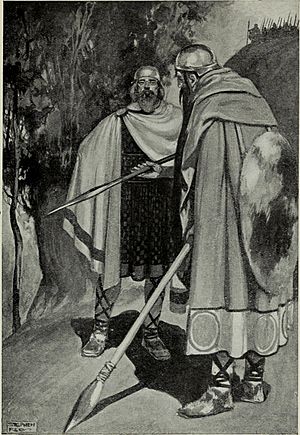Fir Bolg facts for kids
In old Irish myths, the Fir Bolg (also spelled Firbolg) were the fourth group of people to settle in Ireland. They were descendants of an earlier group called the Muintir Nemid. This group had left Ireland and traveled to different parts of Europe. Those who went to Greece eventually became the Fir Bolg. They later returned to Ireland after it had been empty for many years. After ruling the island for some time and dividing it into provinces, they were defeated by another invading group, the Tuatha Dé Danann.
Contents
The Fir Bolg Story
How Ireland Was Settled in Myth
The ancient book Lebor Gabála Érenn tells the story of Ireland being settled six times. Each time, a different group of people arrived. The first three groups—the people of Cessair, the people of Partholón, and the people of Nemed—either died out or had to leave the island.
The Fir Bolg are said to be related to the people of Nemed. Most of Nemed's people were killed in wars or disasters. Only thirty survived. These survivors split into three groups. One group went "into the north of the world." They later became the Tuatha Dé Danann, who are like the main gods in Irish pagan stories. Another group went to Britain. The third group went to Greece.
The Meaning of 'Fir Bolg'
The group who went to Greece became the Fir Bolg. The Lebor Gabála Érenn says that the Greeks made them slaves. They had to carry heavy bags of soil or clay. This is why they were called 'Fir Bolg', which means 'men of bags'. Another old story, the Cath Maige Tuired, says they were forced to live on poor, rocky land. But they worked hard, dumping huge amounts of soil to make the fields fertile.
Ruling Ancient Ireland
After their time in Greece, the Fir Bolg returned to Ireland. They were led by five chieftains. These leaders divided Ireland into five main parts:
- Gann took North Munster.
- Sengann took South Munster.
- Genann took Connacht.
- Rudraige took Ulster.
- Slánga took Leinster.
The Fir Bolg also created the role of the High King of Ireland. Nine High Kings ruled Ireland for the next 37 years. The main place for the High Kings was Tara. This place was very important in medieval times for both religious and royal power. The last Fir Bolg High King was Eochaid mac Eirc. He was seen as a perfect king. The Fir Bolg also included two smaller groups: the Fir Domnann and the Fir Gáilióin.
The Battle with the Tuath Dé
After 37 years, the Tuath Dé Danann arrived in Ireland. Their king, Nuada, asked to be given half of the island. But the Fir Bolg king, Eochaid, said no. The two groups met at a place called the Pass of Balgatan. A big battle followed, known as the First Battle of Mag Tuired. It lasted for four days.
During the battle, Sreng, a great warrior of the Fir Bolg, fought Nuada. Sreng cut off Nuada's right hand with his sword. However, the Fir Bolg were defeated. Their king, Eochaid, was killed by the Morrígan, a goddess of war. Sreng managed to save the remaining Fir Bolg from being completely destroyed.
Some stories say the Fir Bolg fled Ireland after the battle. Other stories say the Tuath Dé offered them one-quarter of Ireland. The Fir Bolg chose to live in Connacht. After this, they are not mentioned much in the myths.
How the Story Developed
An older book called the Historia Brittonum was written before the Lebor Gabála. It said there were only three groups who settled Ireland. These were the people of Partholón, the people of Nemed, and the Gaels. But it did mention a leader named Builc or Builg and his followers. They had taken an island called Eubonia, which is thought to be the Isle of Man.
The Lebor Gabála later added the Fir Bolg into the story. It increased the number of settlements to six. Some people think this number was chosen to match the idea of the "Six Ages of the World" in Christian teachings.
| Preceded by Nemedians |
Mythical settlers of Ireland | Succeeded by Tuatha Dé Danann |
See also
- Na fir bolg (a folk music festival)
- Fir Ol nEchmacht
- Firbolg (Dungeons & Dragons)
- What does the name ‘Fir Bolg’ mean?, Men of Bags.


